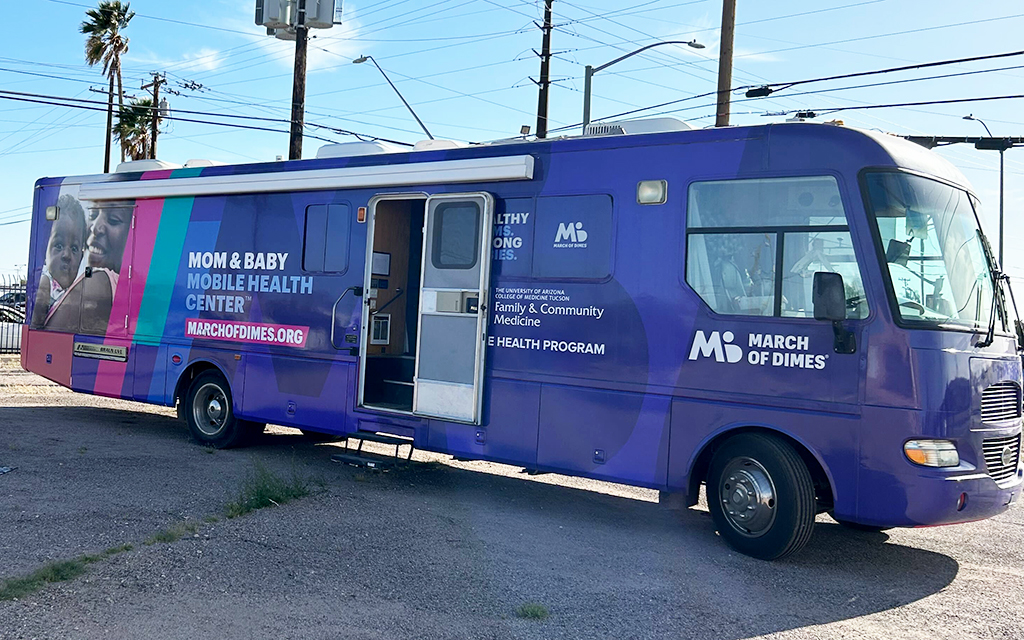TUCSON – The bright purple vacation-RV-turned-mobile-medical-clinic sits in the dirt parking lot of the New Life Community Center in south Tucson. Inside, space is tight, to say the least, but the atmosphere is clean, professional and friendly.
“We’re here because the people keep coming, and it’s a nice environment to be in,” Gregory Loring says with a smile as he sits behind the wheel. “It just makes you feel good.” Loring is the driver and “Jack of all trades,” as he puts it, for the March of Dimes Mom and Baby Mobile Unit.
An arms-length away, Loring’s co-workers chat happily as they greet a new patient.
Whether they’re walking up to car windows or answering knocks on the recreational vehicle’s door, the team’s only questions are patients’ names and how they can help. The mobile clinic’s services are free, providing maternity care for pregnant women and basic medical care for others who are undocumented, unhoused, uninsured or underinsured.
Osiris Lopez, a south Tucson resident and mother of two, visits the mobile clinic for pregnancy care and basic health care needs. She and her husband, immigrants from Mexico, have found it difficult to find health insurance in the U.S.
“One of my cousins who also gave birth told me about the clinic, so that’s how I found out and then I came,” Lopez said in Spanish. Her second child was born in September at the Banner-University Medical Center Hospital after weeks of care from physicians at the mobile unit.
Anahi Briones, a University of Arizona undergraduate studying public health, is the first friendly face patients see when entering the clinic on wheels. Briones, a native of Nogales who speaks Spanish and English, does the initial check-ins. Out of respect, she talks with patients in their preferred language.
“Most of the people I work with are Spanish speakers and because I’m bilingual it helps them feel more comfortable,” she said. Briones said some members of her family who immigrated from Mexico have struggled finding health care. A translator is important.
After check-in, Briones will lead a patient into one of two exam rooms.
The patient has a private consultation with Dr. Cynthia Sanchez or Dr. Francisco Gomez, residents in the Family and Community Medicine program at UArizona.
Gomez has been a doctor on the RV since September 2022 and has built close relationships.
“I’ll see a mom, and then in the next few times I might see that person’s husband, and then I might see their grandmother,” Gomez said, “so that initial interaction is what really keeps bringing people in.”
Shadie Tofigh, director of Maternal and Infant Health with the March of Dimes, said the Tucson-based unit is one of five mobile clinics owned by the March of Dimes, and the only one in Arizona. The clinic is operated by the March of Dimes’ partner, the University of Arizona’s College of Medicine.
The March of Dimes website says the mobile centers are designed to address a problem that more 7 million women in the United States face – limited or no access to maternity care.
Arizona was identified as an area of need in the March of Dimes annual report card on the state of maternal-infant health. The report says 1 in 10 babies in 2021 were preterm, or born before 37 weeks of gestation. The March of Dimes links preterm births to higher rates of illness, and says that babies who are born too soon are often born too small.
Arizona is also home to several populations that have been identified as being at a high risk for preterm births. Hispanic mothers are 6% more likely than white mothers to give birth early, and Black mothers are an astounding 51% more likely to do so. That’s disproportionate to the population – the July 2022 Census, nearly 4 out of every 10 Arizona residents identified as Black or Hispanic.
Dr. Nicole Person-Rennell, the medical director for the mobile health program and an assistant clinical professor at UArizona’s Department of Family and Community Medicine, said medical care carries a high cost many can’t afford.
“Lack of insurance is a huge barrier in the United States health care system,” Person-Rennell said. “Without insurance the cost is incredibly prohibitive to almost everybody.”
The census said nearly 12.8% of Arizona’s population fell below the poverty line last year. In 2021, the American Immigration Council estimated that 13% of Arizonans were born in another country, with more than half born in Mexico.


